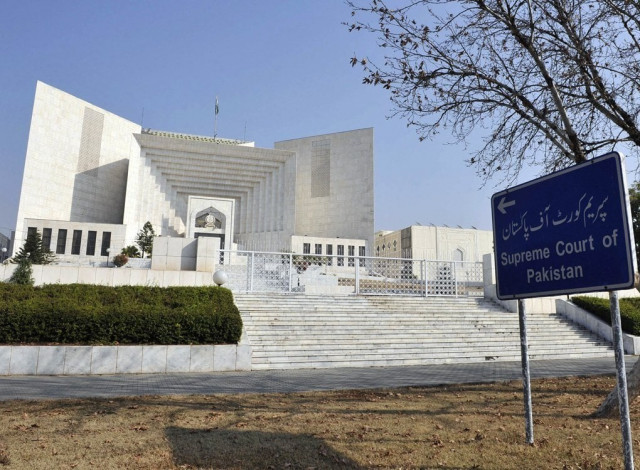SC refuses to set aside sacked workers’ verdict
Top court issues notices to respondents as well as aggrieved persons

The Supreme Court on Thursday refused to suspend its judgment, which led to the sacking of thousands of government employees.
A three-judge special bench of the apex court, led by Justice Umar Ata Bandial and comprising Justice Qazi Muhammad Amin Ahmed and Justice Aminud Khan, heard review petitions filed by the government and sacked workers against the judgment, which struck down the Sacked Employees (Reinstatement) Ordinance Act, 2010.
However, the bench has restrained the government from vacating employees from their official residences and also issued notices to the respondents as well as all those who are aggrieved from the judgment.
A day earlier, a large number of aggrieved people gathered at Islamabad’s Constitution Avenue.
"We are not inclined to suspend the judgment," remarked Justice Bandial after consulting with other members of the bench.
The judge said that despite senior lawyers coming to the rostrum and requesting the bench to suspend the judgment.
Attorney General for Pakistan (AGP) Khalid Jawed Khan also requested the judges to suspend the judgment as ministries’ operations were severely being affected because of the lack of staff.
Justice Qazi Amin Ahmed, who was part of the original bench that delivered the verdict, noted that Pakistan had a large population.
Read SC annuls SHC’s stay on encroachment
"There is a serious issue of transparency and merit in this case as well. We are sitting to hear review petitions with an open heart," the judge remarked. He added that if there was an error in the judgment, then the bench was ready to rectify it.
Another member of the bench noted that charity could not be given from the public exchequer.
The AGP appeared on behalf of the government and raised points for the review of the judgment.
He contended that no notice was sent to him for legal assistance in the matter and also referred to several judgments, wherein it was held that issuance of a notice to the AGP was mandatory in such cases.
He also objected that no notice was sent to the affected employees during the hearing of the main case.
Justice Bandial asked him about the position of the federal government. “Does the federal government want to re-employ them?” he asked. The AGP replied that he had to defend the laws of parliament as it was his job.
"As a federal representative, I want their [employees] rights to be protected," he added/
Justice Bandial noted that the government would have to pay the financial cost if the sacked employees were reinstated.
The court adjourned the proceedings until November 29.
Earlier, the matter was fixed on October 14 but it could not be heard because of the unavailability of the bench.
Justice Mushir Alam, who had authored the judgment in August, has already retired. The SC had struck down the sacked employees law, ruling that the legislation enacted by the then PPP government did not fulfil the criteria laid down by the apex court in numerous cases.
Read more SC questions PM Imran over inaction against APS perpetrators
On appeals against various verdicts of the high courts, a three-member bench, comprising Justice Alam, Justice Qazi Muhammad Amin Ahmed and Justice Aminud Din Khan, had directed that all benefits accrued to the beneficiaries of the Act be stopped with immediate effect.
“The Act has extended the undue advantage to a certain class of citizens thereby violating the fundamental rights under Article 4, 9, and 25 of the employees in the Service of Pakistan and being void under Article 8 of the Constitution,” read the judgment.
“While the Act of 2010 intends for reinstatement, the jurisprudence of this Court has clearly laid down the nuances entailed by the term ‘reinstatement’. The Act of 2010 does not fulfill the criteria laid down by this Court in numerous cases,” it added.
The federal government in its review petition stated that the court had passed the judgment without issuing a formal notice under order XXVIIA CPC and hearing the AGP, particularly with reference to the constitutionality of the Act.
It added that the employees, who had been conferred benefits under the Act and who numbered in thousands, were neither heard nor provided an opportunity of hearing before the adverse action was taken against them.
The petition further stated that the judgment under review was passed ignoring the principle of natural justice and liable to be reviewed and recalled on this ground alone.
The plea further highlighted that the impugned judgment was reserved on December 16, 2019 but was not announced until August 17, 2021, after a lapse of 20 months, which was against the set principles of due process.
It was also submitted that the legitimate rights and interests of the existing employees, including their seniority positions and promotion prospects, could have been protected without declaring the entire Act as ultra vires the Constitution.
(With input from APP)



















COMMENTS
Comments are moderated and generally will be posted if they are on-topic and not abusive.
For more information, please see our Comments FAQ